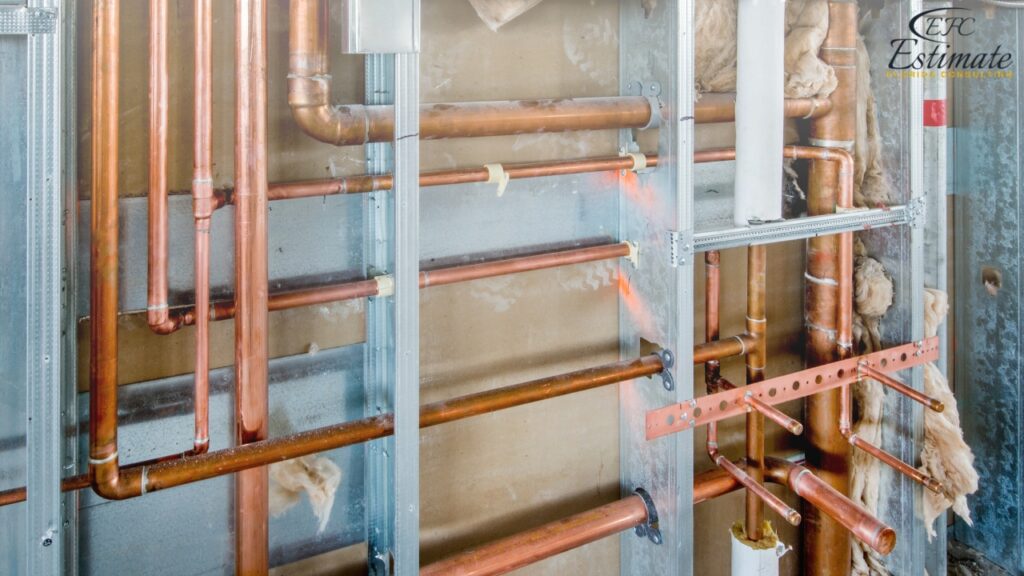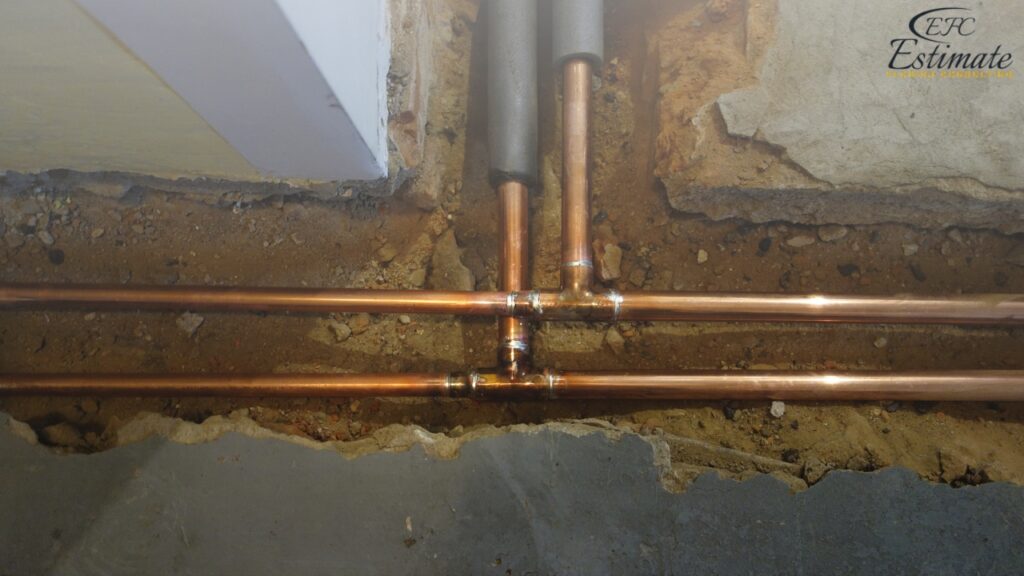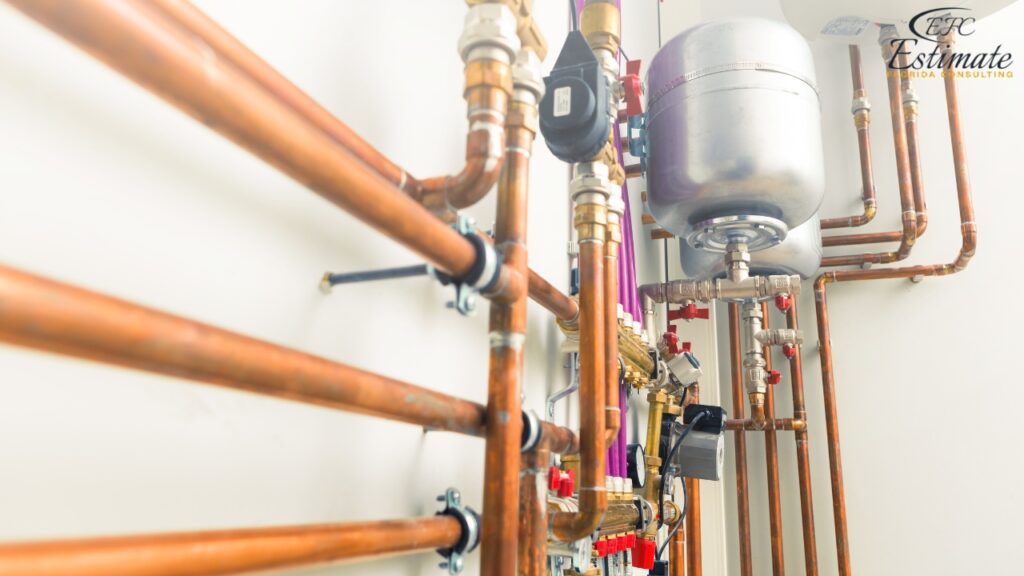How Much Does It Cost to Repipe a House with Copper?
Re-piping a house with copper typically costs between $12,030 and $41,967.50. The total expense varies based on the size of the house, complexity of the job, and local labor rates. Copper piping is durable and resistant to corrosion, but it is more expensive than other materials like PEX. For a precise quote, factors such as the layout of the plumbing, the number of fixtures, and any necessary repairs or upgrades to the existing system will be considered. Always obtain multiple quotes from licensed plumbers to ensure competitive pricing.

Average Cost to Repipe a House with Copper
The average cost to repipe a house with copper ranges between $10,530 and $33,800. This price includes the cost of materials, labor, and any additional expenses such as permits and wall repairs. The cost per square foot can vary significantly based on the specific requirements of the project and regional pricing differences. This range ensures that you can anticipate potential expenses and plan your budget accordingly, accounting for both expected and unforeseen costs.
House Size | Estimated Cost Range |
Small (1,000 sq ft) | $10,530 – $14,040 |
Medium (1,500 sq ft) | $17,550 – $22,815 |
Large (2,500 sq ft) | $27,300 – $33,800 |
Factors Influencing the Cost
Size of the House
The size of the house is a primary factor influencing the cost of repiping. Larger houses require more piping and additional labor, leading to higher costs. The number of bathrooms, kitchens, and other water-using appliances also affects the total cost. For example, a small house with one bathroom and a simple plumbing system will cost significantly less to repipe than a larger house with multiple bathrooms, a kitchen, and a laundry room. The complexity of the plumbing layout, such as the presence of multiple stories or intricate piping configurations, can also impact the cost. Additionally, larger homes may have more complex water delivery systems, requiring more detailed planning and execution.
Material Costs
The cost of copper pipes is one of the most significant expenses in a repiping project. Copper is a durable and long-lasting material that is resistant to corrosion and can handle high water pressure. However, it is also one of the more expensive piping materials. Copper’s reliability and longevity often justify its higher price, as it can provide decades of trouble-free service.
Material Type | Estimated Cost per Linear Foot |
Copper Pipes | $5.85 – $8.45 |
In addition to the pipes themselves, other materials such as fittings, valves, and connectors will also be required. These materials can add to the overall cost but are essential for a properly functioning plumbing system. Copper pipes come in different grades and thicknesses, which can also affect the cost. Higher-grade pipes, while more expensive, offer enhanced durability and performance, ensuring a more resilient plumbing system.
Labor Costs
Labor costs are another significant component of the overall expense when repiping a house. These costs can vary based on the complexity of the project, local labor rates, and the experience of the plumbers. Skilled labor is essential to ensure proper installation and compliance with local building codes. Professional plumbers bring expertise that can prevent issues such as leaks or improper water pressure.
Labor Task | Estimated Cost per Hour | Total Hours Required | Total Cost Range |
Pipe Removal | $91 – $130 | 20 – 30 | $1,820 – $3,900 |
New Pipe Installation | $91 – $130 | 60 – 100 | $5,460 – $13,000 |
Wall Repair | $65 – $104 | 10 – 20 | $650 – $2,080 |
The cost of labor includes not only the wages of the plumbers but also the fees for project management, supervision, and quality control. Ensuring that the repiping is carried out by experienced professionals can prevent costly mistakes and ensure that the plumbing system is built to last. Proper installation can also ensure compliance with local building codes, avoiding future legal or safety issues.
Additional Costs
Permits and Inspections
Obtaining the necessary permits and complying with local building regulations are essential steps in the repiping process. Permit costs can vary based on location and the scope of the project. Ensuring compliance with regulations helps avoid fines and ensures that the project meets all safety standards. Proper permitting also ensures that the work is inspected and verified for quality and safety.
Permit Type | Estimated Cost Range |
Plumbing Permit | $260 – $650 |
Inspection Fees | $130 – $390 |
Inspections at various stages of the repiping process are required to ensure the work adheres to approved plans and standards. Regular inspections help identify and rectify any issues early in the process, preventing costly rework and ensuring compliance with all relevant regulations. This process helps maintain the integrity of the project and ensures long-term reliability of the plumbing system.
Wall Repairs and Restoration
Repiping a house often requires cutting into walls to access the existing pipes. Once the new pipes are installed, these walls will need to be repaired and restored. This can include patching drywall, repainting, and refinishing surfaces. Proper restoration ensures that the home’s aesthetic appeal is maintained, and any disruptions caused by the repiping process are minimized.
Repair Task | Estimated Cost Range |
Drywall Repair | $390 – $1,560 |
Painting | $520 – $2,080 |
Properly restoring walls and surfaces ensures that the house maintains its aesthetic appeal and that any disruptions caused by the repiping process are addressed. These additional costs should be factored into the overall budget for the project. Ensuring that the repairs are done correctly can prevent future issues, such as structural weaknesses or aesthetic inconsistencies, maintaining the home’s value and appearance.
Benefits of Repiping with Copper
Repiping with copper offers several advantages, including durability, longevity, and reliability. Copper pipes are resistant to corrosion, can handle high water pressure, and have a long lifespan, often lasting 50 years or more. Additionally, copper is a bacteriostatic material, meaning it inhibits the growth of bacteria, which can improve water quality. Copper pipes also add value to your home, as they are considered a premium plumbing material. This can be an important consideration if you plan to sell your house in the future. The upfront cost of repiping with copper can be higher than other materials, but the long-term benefits and reduced maintenance costs make it a worthwhile investment.

Copper’s superior performance and reliability often justify its higher initial cost, offering peace of mind and improved home value.
Comparison with Other Materials
While copper is a popular choice for repiping, it is not the only option available. PEX (cross-linked polyethylene) and CPVC (chlorinated polyvinyl chloride) are two other common materials used in repiping projects. Each material has its own set of advantages and disadvantages, and the choice will depend on your specific needs and budget. Understanding the differences between these materials can help you choose the best option for your home.
Material Type | Estimated Cost per Linear Foot | Durability | Maintenance |
Copper | $5.85 – $8.45 | High | Low |
PEX | $1.95 – $4.55 | Moderate | Low |
CPVC | $3.25 – $5.20 | Moderate | Moderate |
PEX and CPVC are generally less expensive than copper and are easier to install. However, they may not have the same longevity and resistance to high water pressure as copper. Consulting with a professional plumber can help you determine the best material for your repiping project. Factors such as the local climate, water quality, and specific home requirements can influence the choice of material.
Cost Breakdown by House Size
The cost to repipe a house with copper can vary widely based on the size of the house and the complexity of the plumbing system. Here’s a breakdown of the potential costs based on different house sizes:
Get 5 New Leads Next 7Days With Our System
- Multi-Family Building
- Hotel Building
- Hospital Building
- Warehouse Building
- High-Rise Building
- Shopping Complex
Small House (1,000 sq ft)
Cost Category | Estimated Cost Range |
Copper Pipes | $2,925 – $4,225 |
Labor Costs | $6,500 – $9,750 |
Permits and Inspections | $260 – $650 |
Wall Repairs | $845 – $1,560 |
Total Cost | $10,530 – $16,185 |
A small house typically has a simpler plumbing layout, which can reduce the overall cost. Fewer fixtures and shorter pipe runs make for a less labor-intensive project.
Medium House (1,500 sq ft)
Cost Category | Estimated Cost Range |
Copper Pipes | $4,387.5 – $6,337.5 |
Labor Costs | $9,750 – $14,625 |
Permits and Inspections | $325 – $780 |
Wall Repairs | $1,170 – $2,080 |
Total Cost | $17,550 – $23,822.5 |
A medium house may have more complex plumbing needs, including multiple bathrooms and possibly more intricate pipe routing. This can increase both material and labor costs.
Large House (2,500 sq ft)
Cost Category | Estimated Cost Range |
Copper Pipes | $7,312.5 – $10,562.5 |
Labor Costs | $16,250 – $24,375 |
Permits and Inspections | $390 – $910 |
Wall Repairs | $1,560 – $3,120 |
Total Cost | $27,300 – $38,967.5 |
A large house will have the most complex plumbing system, with more fixtures and longer pipe runs. This makes the project more labor-intensive and requires more materials, contributing to higher overall costs.
Factors Affecting Copper Repiping Costs
Several factors can influence the total cost of repiping a house with copper. Understanding these factors can help you plan and budget more effectively.
Accessibility of Existing Pipes
If the existing pipes are easily accessible, the labor costs may be lower. However, if the pipes are located behind walls, under floors, or in hard-to-reach areas, additional labor and time will be required to remove and replace them. This can increase the overall cost of the project. Homes with finished basements or complex structural layouts may present additional challenges that add to labor costs.
Number of Fixtures
The number of plumbing fixtures in the house, such as sinks, toilets, showers, and bathtubs, will also impact the cost. More fixtures mean more connections and additional labor, which can increase the total cost. Each fixture requires precise installation to ensure proper functionality and prevent leaks. Homes with extensive plumbing systems, including outdoor fixtures and multiple water heaters, will see higher costs due to the additional work required.

Type of Copper Pipes
There are different types of copper pipes available, each with varying costs. Type L copper pipes are thicker and more durable, making them suitable for most residential applications. Type M copper pipes are thinner and less expensive but may not be as durable. The choice of pipe type will affect the overall cost and longevity of the plumbing system. Using higher-quality pipes can increase upfront costs but provide longer-lasting performance and fewer maintenance issues over time.
Enhancements and Upgrades
While repiping your house with copper, you may also consider additional upgrades and enhancements to improve the overall functionality and efficiency of your plumbing system.
Water Filtration Systems
Installing a whole-house water filtration system can improve water quality by removing contaminants such as chlorine, lead, and sediment. This upgrade can provide cleaner, safer water for drinking, cooking, and bathing. Additionally, filtered water can extend the lifespan of your plumbing system and appliances by reducing mineral buildup and corrosion. The cost of a water filtration system varies based on the type and capacity but generally ranges from $1,500 to $3,000, including installation.
Pressure Regulating Valves
Adding a pressure regulating valve can help maintain consistent water pressure throughout your home, protecting your plumbing system and fixtures from damage caused by high water pressure. This upgrade can also improve water efficiency and reduce the risk of leaks. Pressure regulating valves typically cost between $200 and $400, plus installation.
Smart Home Plumbing Devices
Integrating smart home technology into your plumbing system can provide added convenience and protection. Smart leak detectors, water shutoff valves, and water usage monitors can alert you to potential issues and help you manage water consumption more effectively. These devices can range from $50 to $500 each, depending on the features and capabilities, with additional installation costs.
Download Template For Plumbing Project Breakdown
- Materials list updated to the zip code
- Fast delivery
- Data base of general contractors and sub-contractors
- Local estimators

Conclusion
Repiping a house with copper is a significant investment that can enhance the durability and reliability of your plumbing system. By understanding the various costs involved and planning accordingly, you can create a realistic budget and ensure a successful repiping project. Proper planning, quality materials, and skilled labor are essential for achieving a durable and efficient plumbing system. Investing in copper pipes can provide long-term benefits and add value to your home, making it a worthwhile investment in the long run. Whether you are upgrading for personal enjoyment or increasing the market value of your property, choosing the right materials and ensuring proper installation are key to a successful renovation.
FAQs
Repiping a house with copper typically costs between $12,030 and $41,967.50. The total expense varies based on the size of the house, complexity of the job, and local labor rates.
Copper piping is more expensive because it is durable, resistant to corrosion, and can handle high water pressure. Its longevity and reliability often justify the higher cost compared to materials like PEX.
Factors include the layout of the plumbing, the number of fixtures, any necessary repairs or upgrades, the size of the house, local labor rates, and the complexity of the job.
The average cost ranges between $10,530 and $33,800. This includes materials, labor, permits, and wall repairs.
Larger houses require more piping and additional labor, leading to higher costs. The number of bathrooms, kitchens, and other water-using appliances also affects the total cost.
- Small (1,000 sq ft): $10,530 – $16,185
- Medium (1,500 sq ft): $17,550 – $23,822.50
- Large (2,500 sq ft): $27,300 – $38,967.50
The cost of copper pipes ranges from $5.85 to $8.45 per linear foot. This includes the pipes, fittings, valves, and connectors.
Labor costs vary based on the complexity of the project, local rates, and the plumbers’ experience. Labor includes pipe removal, new pipe installation, and wall repairs.
Additional costs include permits, inspections, and wall repairs. Permit costs can range from $260 to $650, and wall repair costs can range from $845 to $3,120.
Benefits include durability, longevity, and reliability. Copper pipes are resistant to corrosion, handle high water pressure, and can last 50 years or more. They also add value to your home.
Google Reviews



Process To Get Repipe a House with Copper Estimate Report
Here I am going to share some steps to get repipe a house with copper estimate report.
-
You need to send your plan to us.
You can send us your plan on info@estimatorflorida.com
-
You receive a quote for your project.
Before starting your project, we send you a quote for your service. That quote will have detailed information about your project. Here you will get information about the size, difficulty, complexity and bid date when determining pricing.
-
Get Estimate Report
Our team will takeoff and estimate your project. When we deliver you’ll receive a PDF and an Excel file of your estimate. We can also offer construction lead generation services for the jobs you’d like to pursue further.

